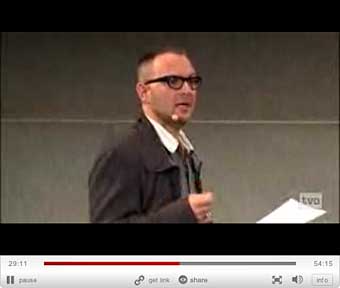“We are the People of the Book”
Here’s a good stemwinder by Cory Doctorow from earlier this year (via Dirk) on the many complex ways copyright control legislation and information access are at war.
A lot of people in comics—writers, artists, publishers—are pinning their hopes on legal protections and new walled gardens like App Stores to restore some sense of stability and control to what looks increasingly like the same leaky boat scenario that’s affecting other creative fields.
It’s important, though, to consider the many ways that the “remedy” being proposed and implemented is far worse than the “disease” of widespread sharing.
I’ve always hoped that a culture of willing buyers and willing sellers, however small, can continue to emerge alongside file-sharing. But the key word was always willing; a concept increasingly at odds with the world Cory is rightly warning us about.















My friend Arlo uses Labor Day to try supporting the artists and developers he thinks benefit from and deserve it. It’s a mindset that pushes back against the tide but maybe indicates that there will always be a pocket of people who understand the importance of being a willing buyer.
http://blog.arlomidgett.com/2010/09/06/true-fan-boost-2010/
First, it’s obvious that what happened to the music industry will happen to comics, in spades. There is already a culture that expects digital comics to be free. So piracy isn’t going away and that means many comic business models will fail.
That said, Doctorow’s main theme is wrong. He’s comparing the ability to share or bequeath paper comics and complaining that sellers of digital comics are trying to prevent that. But what he ignores is that if you give your paper comic to someone else, you don’t have the comic anymore. A real comparison would be where you can lend someone else your digital comic, as long as you remove it from your own hard drive.
Also he’s focusing on corporate legal departments (and who feels sorry for them?). He conveniently ignores the fact that owner / creators / artists that are creating comic content are also affected by piracy.
The comics industry can survive digital piracy only if they convince fans that (1) it’s worth it to support their comics with their purchase and (2) if they don’t support them, they won’t make any more comics.
What Doctorow is doing is especially pernicious because it gives buyers the illusion that downloading pirated comics is okay or, even worse, that pirates and downloaders somehow have the moral high ground. This is simply wrong.
Whew. That’s enough ranting for one day. I’ll go take my meds now…
Dang. I came too late to this page, and the video no longer loads.
On the other hand, Scott, your commentary led me to this fascinating page on the origin of the term, “stemwinder”.
http://www.word-detective.com/2008/10/07/stemwinder/